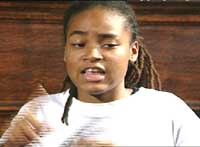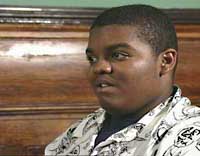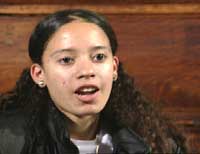Dena, 14 [Listen with Real
Player
with wav]
 [All rise for the honorable Judge Dena Kilpatrick.] Welcome to Harlem
Youth Court. My name is Dena Kilpatrick and I’ll be the judge
for this evening’s session. This court is now in session. Please
raise your right hand and repeat after me: I solemnly do affirm
to keep everything I hear during this Youth Court session completely
confidential. You may all be seated. The oath of confidentiality
is being handed out by the jury foreperson — please sign them,
if any questions please feel free to ask.
[All rise for the honorable Judge Dena Kilpatrick.] Welcome to Harlem
Youth Court. My name is Dena Kilpatrick and I’ll be the judge
for this evening’s session. This court is now in session. Please
raise your right hand and repeat after me: I solemnly do affirm
to keep everything I hear during this Youth Court session completely
confidential. You may all be seated. The oath of confidentiality
is being handed out by the jury foreperson — please sign them,
if any questions please feel free to ask.
Madama, 17 [Listen with Real
Player with wav]
 When I first went in there, I thought he was lying, because you
know he’s really young and maybe he thought he would get in
more trouble if he told the truth. But as I talked to him, I found
out that he was just really nervous. And he really didn’t do
what he did. And I had a problem doing my opening statement for
the simple fact that I wanted it to be strong enough to convince
the jury at the very beginning, but it didn’t happen that way,
and I got stronger when I did my closing statement. Because he really
didn’t deserve any hours, and the fact that this is on his
permanent record, everywhere he goes they’re going to look
at him as another person, not as a new boy coming into this school
. . .
When I first went in there, I thought he was lying, because you
know he’s really young and maybe he thought he would get in
more trouble if he told the truth. But as I talked to him, I found
out that he was just really nervous. And he really didn’t do
what he did. And I had a problem doing my opening statement for
the simple fact that I wanted it to be strong enough to convince
the jury at the very beginning, but it didn’t happen that way,
and I got stronger when I did my closing statement. Because he really
didn’t deserve any hours, and the fact that this is on his
permanent record, everywhere he goes they’re going to look
at him as another person, not as a new boy coming into this school
. . .
Juston, 17 [Listen with Real
Player with wav]
 One thing I’m learning how to do right now is to clearly speak
and to speak slowly, cause if you came here four years ago, I would
just sit here and not say nothing, and you know, being in Youth
Court taught me how to be a better public speaker and speak more
clearly and slowly.
One thing I’m learning how to do right now is to clearly speak
and to speak slowly, cause if you came here four years ago, I would
just sit here and not say nothing, and you know, being in Youth
Court taught me how to be a better public speaker and speak more
clearly and slowly.
[Listen with Real Player with wav]
Basically, it’s like a voluntary process. They don’t
have to be here. In adult court, it’s like both sides working
against each other, but in youth court we work with each other,
the Community and the Youth Advocate and the jury, we’re all
here for one purpose, and that’s to help the youth respondent
be responsible for what he or she has done.
 Alex, 14 [Listen with Real
Player with wav]
Alex, 14 [Listen with Real
Player with wav]
In school, teachers ask you questions, and you answer, but we’re
kids. Teachers don’t understand kids, but kids understand kids,
so if we ask him a question he might answer us in a way that we
will understand him.
Yohany, 17 [Listen with Real
Player with wav]
 In school it’s not the same because here, any little problem
that you have, you can speak to them and they will have the time,
they will sit down and actually take the time and listen to what
exactly you want them to help you with. From my experience here
I’ve learned to become a better speaker, I was always shy.
. . . We have to do presentations here and talk with the people
that come to see us, and I’ve learned how to speak more out
loud, and I’m not afraid of talking in front of people any
more.
In school it’s not the same because here, any little problem
that you have, you can speak to them and they will have the time,
they will sit down and actually take the time and listen to what
exactly you want them to help you with. From my experience here
I’ve learned to become a better speaker, I was always shy.
. . . We have to do presentations here and talk with the people
that come to see us, and I’ve learned how to speak more out
loud, and I’m not afraid of talking in front of people any
more.
Youth Courth Extensions
More about the Harlem Youth Court
A WKCD interview with mentor Jabari Osaze
Hear audio clips of Harlem Youth
Court members
Resources and information on youth
courts nationwide
Read more of this WKCD feature story, "Making Peace, Restoring
Justice"
City at Peace
Peacemaking Circles
Back to Introduction
 [All rise for the honorable Judge Dena Kilpatrick.] Welcome to Harlem
Youth Court. My name is Dena Kilpatrick and I’ll be the judge
for this evening’s session. This court is now in session. Please
raise your right hand and repeat after me: I solemnly do affirm
to keep everything I hear during this Youth Court session completely
confidential. You may all be seated. The oath of confidentiality
is being handed out by the jury foreperson — please sign them,
if any questions please feel free to ask.
[All rise for the honorable Judge Dena Kilpatrick.] Welcome to Harlem
Youth Court. My name is Dena Kilpatrick and I’ll be the judge
for this evening’s session. This court is now in session. Please
raise your right hand and repeat after me: I solemnly do affirm
to keep everything I hear during this Youth Court session completely
confidential. You may all be seated. The oath of confidentiality
is being handed out by the jury foreperson — please sign them,
if any questions please feel free to ask.
 When I first went in there, I thought he was lying, because you
know he’s really young and maybe he thought he would get in
more trouble if he told the truth. But as I talked to him, I found
out that he was just really nervous. And he really didn’t do
what he did. And I had a problem doing my opening statement for
the simple fact that I wanted it to be strong enough to convince
the jury at the very beginning, but it didn’t happen that way,
and I got stronger when I did my closing statement. Because he really
didn’t deserve any hours, and the fact that this is on his
permanent record, everywhere he goes they’re going to look
at him as another person, not as a new boy coming into this school
. . .
When I first went in there, I thought he was lying, because you
know he’s really young and maybe he thought he would get in
more trouble if he told the truth. But as I talked to him, I found
out that he was just really nervous. And he really didn’t do
what he did. And I had a problem doing my opening statement for
the simple fact that I wanted it to be strong enough to convince
the jury at the very beginning, but it didn’t happen that way,
and I got stronger when I did my closing statement. Because he really
didn’t deserve any hours, and the fact that this is on his
permanent record, everywhere he goes they’re going to look
at him as another person, not as a new boy coming into this school
. . .
 One thing I’m learning how to do right now is to clearly speak
and to speak slowly, cause if you came here four years ago, I would
just sit here and not say nothing, and you know, being in Youth
Court taught me how to be a better public speaker and speak more
clearly and slowly.
One thing I’m learning how to do right now is to clearly speak
and to speak slowly, cause if you came here four years ago, I would
just sit here and not say nothing, and you know, being in Youth
Court taught me how to be a better public speaker and speak more
clearly and slowly.
 Alex, 14 [Listen with
Alex, 14 [Listen with  In school it’s not the same because here, any little problem
that you have, you can speak to them and they will have the time,
they will sit down and actually take the time and listen to what
exactly you want them to help you with. From my experience here
I’ve learned to become a better speaker, I was always shy.
. . . We have to do presentations here and talk with the people
that come to see us, and I’ve learned how to speak more out
loud, and I’m not afraid of talking in front of people any
more.
In school it’s not the same because here, any little problem
that you have, you can speak to them and they will have the time,
they will sit down and actually take the time and listen to what
exactly you want them to help you with. From my experience here
I’ve learned to become a better speaker, I was always shy.
. . . We have to do presentations here and talk with the people
that come to see us, and I’ve learned how to speak more out
loud, and I’m not afraid of talking in front of people any
more.